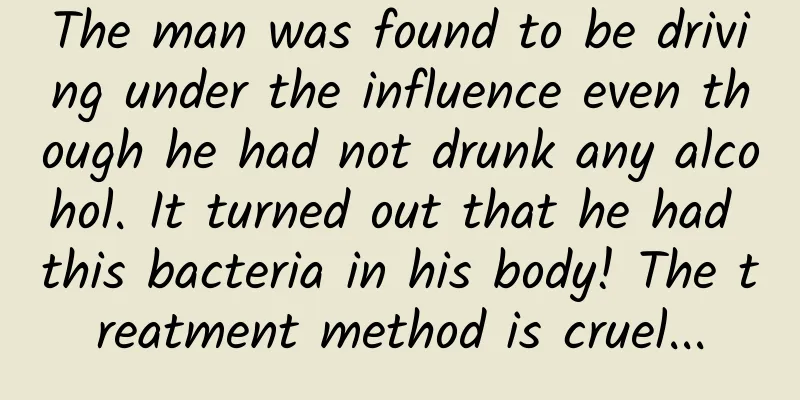The man was found to be driving under the influence even though he had not drunk any alcohol. It turned out that he had this bacteria in his body! The treatment method is cruel...

|
One late night in April 2020, in the small town of Bruges, Belgium, a 47-year-old man drove home after a day of work at a brewery. His car drove smoothly on the town's highway, music flowed gently in the car, and the street lights cast a dim light. But just after turning a corner, his life suddenly turned upside down. "Sir, please pull over." The flashing lights of the police car were dazzling in the night. Law enforcement officers came over and conducted a routine alcohol test - this is normal in this country with a strong beer culture. A few minutes later, the number on the breathalyzer shocked everyone: 0.2 mg! This is more than twice the legal limit! "I didn't drink at all!" The man looked innocent, his voice full of confusion and grievance. However, the data displayed by the instrument was cold and ruthless. The police ignored his excuses and could only take him back. What was even more frustrating was that a month later, he was stopped again, and his alcohol reading was still alarming. Copyright images in the gallery. Reprinting and using them may lead to copyright disputes. The man's story was like something out of a black comedy movie, but it actually happened in real life. Eventually, the court found out the truth - Jean suffered from a rare disease: Auto- Brewery Syndrome (ABS), a disease that sounds like "magic". What is Auto-brewery Syndrome? It sounds like science fiction, but it's a real condition. In simple terms, auto-brewery syndrome is when your gut "brews" alcohol. There are numerous microorganisms living in the human intestines, such as bacteria, fungi, yeasts, etc., some of which are beneficial and some are harmful. However, under certain circumstances (such as decreased immunity, intestinal flora imbalance, etc.), yeasts or fungi in the intestines begin to multiply in large numbers and use the carbohydrates we consume, such as rice, bread, sugar, etc., to ferment them into ethanol (also known as alcohol). That’s right! The whole process is exactly the same as brewing in a brewery! As a result, the alcohol is absorbed by the intestinal wall into the blood, and the blood alcohol concentration soars, and the result is - drunk! But the problem is that you didn't drink at all, and you may have just eaten a meal of rice or noodles. This man is not the only victim. Many people around the world who suffer from auto-brewery syndrome have had bizarre and ridiculous experiences: In a previous case, Donato Giannotto's intestines produced very high levels of alcohol, occasionally reaching eight times the legal limit for intoxication, and he even developed acute pancreatitisCredit: Giannotto In late December 2014, about 11,000 salmon fell from a truck that crashed and overturned on the McKenzie River Highway outside Eugene, Oregon. The driver was charged with DUI, and his defense was that his body made its own alcohol. There was also a Japanese engineer who worked diligently but was often mistaken for an alcoholic and was even suspected by the company of drinking secretly. The common feature of these patients is that they have an "invisible brewery" in their bodies. Auto-brewery syndrome is not a new disease name. It has been sporadically recorded in the medical community as early as the early 20th century. It first attracted widespread attention in the 1970s, when doctors noticed that some patients had abnormal ethanol production in their bodies, but they did not drink alcohol. In recent years, with the advancement of medical testing technology, scientists have learned more about auto-brewery syndrome. The root cause of auto-brewery syndrome is an imbalance in intestinal flora. Yeast in the intestine (such as Candida albicans or other fungi) proliferate abnormally, and they use carbohydrates to ferment and produce ethanol, causing patients to experience symptoms of drunkenness. Source: Literature In normal people, beneficial bacteria and harmful bacteria in the intestinal flora balance each other, and the number of microorganisms such as yeast will be suppressed. However, in ABS patients, this balance is broken, the number of beneficial bacteria decreases, and fungi are rampant. Studies have found that after patients consume high carbohydrates, the alcohol concentration in their bodies will rise rapidly and can even reach fatal levels. This phenomenon also makes doctors realize that many patients who are misdiagnosed as "alcoholism" may just be suffering from ABS. Diagnosing this disease is not easy because it is so rare that many doctors have never even heard of it. To diagnose it, the patient must fast and test the blood alcohol content. Then let the patient consume a certain amount of carbohydrates and then test the changes in ethanol in the blood. How to treat it? Returning to the case described above, the doctor initially prescribed oral antifungal medication and a low-carbohydrate diet. But the results were modest. Even four weeks of high doses of the highly effective antifungal drug amphotericin did not seem to do the trick: the patient still experienced a loss of appetite, and his wife said she could smell alcohol on her husband’s breath. Later, doctors decided to use a new method, fecal microbiota transplantation, or stool transplantation. This treatment method transplants healthy people's feces (after special treatment) into the patient's intestines to rebuild healthy intestinal flora and achieve the effect of treating intestinal disorders. Fecal transplant method Source: MDPI Doctors collected fecal samples from his daughter's voluntary donation, processed them, and injected the fecal fluid into the patient's digestive tract. Fortunately, the transplant was very effective. In the past three years, the patient's ABS symptoms have not recurred, and the ethanol level in his blood has returned to normal. He even got his driver's license back. This approach can not only treat ABS, but may also have potential therapeutic effects on other diseases related to intestinal flora imbalance (such as non-alcoholic fatty liver disease and irritable bowel syndrome). Is the prevalence high? How rare is this disease? Should you be worried? There are only a few dozen cases of ABS in the world, but researchers believe that the disease may be seriously underestimated. Many mild patients may not be diagnosed or even treated as ordinary digestive problems. If you often feel "drunk" for no apparent reason, or someone around you says you smell like alcohol but you haven't drunk at all, please go to the hospital to check your intestines! So, next time you hear someone say that he gets drunk after eating a bowl of rice, don’t laugh too quickly, because he may not be joking! References [1]https://www.cureus.com/articles/165862-the-associations-of-auto-brewery-syndrome-and-diabetes-mellitus-a-literature-review-and-clinical-perspective#!/ [2]https://www.today.com/health/disease/man-shares-auto-brewery-syndrome-symptoms-rcna77263 Planning and production Source: Bring Science Home (ID: steamforkids) Author: Su Chengyu Editor: Zhong Yanping Proofread by Xu Lailinlin |
Recommend
Adding “5G” after the Wi-Fi name will make the Internet faster?
When connecting to Wi-Fi, many netizens may find ...
Product Operation: Is your product suitable for fission?
Regarding fission, there have been several questi...
The dwarf killer: the African pygmy falcon
When we talk about birds of prey, we will definit...
Use these UI experience optimization techniques to make your designs more advanced!
Hi, I'm Caiyun. We often talk about optimizin...
Entering the active stage! Once infected, it is likely to be life-threatening
Mr. Gao's hometown is in the mountainous area...
How to use custom menus in WeChat Enterprise Account Development
Each application in the enterprise account can ha...
APP development: How to choose between iOS and Android? You can do this
We all know that the mobile phone operating syste...
The most effective user growth methodology!
Isn’t the value of the product what makes users b...
Will the highways be free during the Dragon Boat Festival in 2020? How will the Dragon Boat Festival be celebrated in 2020? When is the Dragon Boat Festival in 2020?
Because there is an extra fourth month in the lun...
3 rules for making products, videos and copywriting popular!
In an era where content is king, if you want your...
The most comprehensive case analysis of event planning and operation strategies
Today I’d like to talk to you about how to run a ...
Product Analysis Report | Analysis of Mango TV Membership System
With the continuous development of the video indu...
Plague warning! Catching pikas and touching groundhogs, are you risking your life?!
Pikas and marmots are popular again. A blogger fo...
Top 10 Classic Python Introductory Books
Book Introduction This is a classic Python introd...
Did prehistoric civilization exist? If not, where did this 300 million-year-old screw come from?
The Earth is about 4.6 billion years old since it...









